With growing challenges in the beer market and increasing competition from other drink sectors, many breweries are looking for innovative ways to leverage their taprooms and bring in new customers. For some breweries that means opening their spaces to the public earlier in the day.
Taprooms have long been community meeting places, and now some are choosing to welcome that community bright and early by using their buildings as coffee shops and all-day workspaces.
The Virginia Beer Company | Williamsburg, Va.
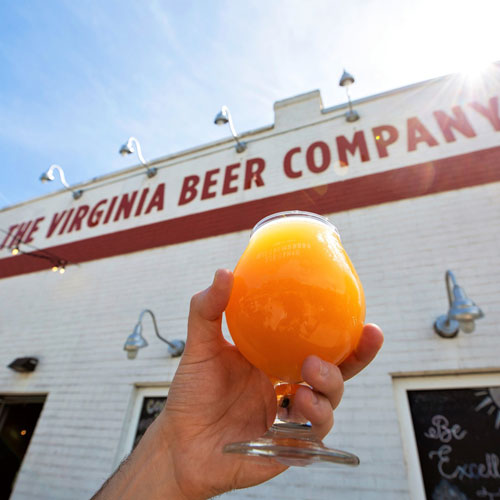
The Virginia Beer Company recently made the decision to launch a coffee shop and breakfast menu, opening early in the morning in hopes of attracting a working crowd.
“We wanted to be part of the fabric of our community,” says co-founder Chris Smith. “If we want to reach a wider audience, this is a way to do that.”
The brewery is currently in the build-out stage for the coffee operation. Smith says he and the rest of the management team figured if they already had the building, they might as well get everything out of it they could.
“From a business perspective, the overhead is already mostly covered,” he explains. “We’re paying our lease on the building, the heat’s running, the lights are on. It’s incrementally not that huge of an increase.”
Smith plans to run the coffee shop/kitchen and beer service programs independently, with separately trained staff and points of service and a manager who is cross trained in both areas. The main challenge he foresees is figuring out how many staff members to have working in each area, particularly during the cross-over time period in early afternoon.
Living Waters Brewing | Nashville, Tenn.
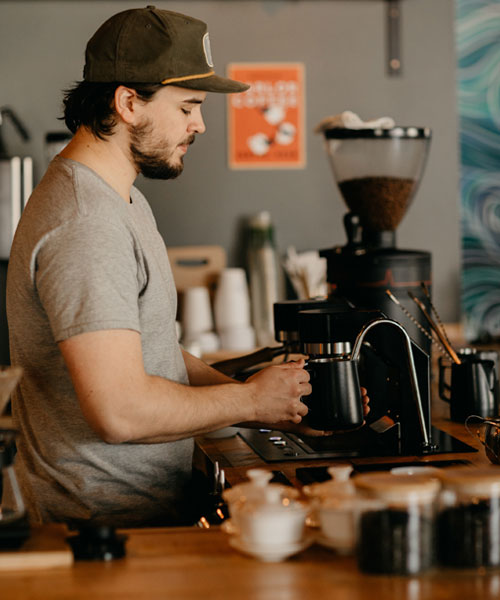
Living Waters Brewing went all-in on the approach when they opened as both a brewery and a coffee shop in 2019. Beer and coffee sales are handled at the same bar counter, serviced by fully cross-trained staff. The business was founded by a brewer (Ryan McCay), a coffee professional (Gentry Wigginton), and a musician (Thomas Becker), with each managing the operational areas they specialize in.
The bar houses the beer taps as well as an espresso machine, coffee grinders, hot water towers, and all the accoutrements needed for both beverages. It allows for streamlined service but does present challenges.
“The needs of a coffee shop are not necessarily aligned with the needs of the taproom, so the distance from the taps to the customer space for things like milk fridges and ice makers is a problem,” says McCay. “We just don’t have a ton of space. We have to get pretty creative. I wouldn’t say it’s an ideal workflow.”
McCay says the biggest advantage of this format has been the versatility of staff in making informed recommendations for customers.
WeHa Brewing | West Hartford, Conn.
WeHa Brewing has also experienced challenges around the geography of its taproom and coffee shop, but the problem exists outside the brewery’s walls: the ideal locations for a taproom and a coffee shop are not necessarily the same. The brewery has a standalone building in a shopping center.
“Traditional coffee shops are in areas with higher foot traffic, where with breweries people go out of their way to travel to them,” explains founder Cody McCormack. “We have plenty of space [because of where we’re located], but we’re not in a high traffic area.”
WeHa has separate beer and coffee bars on opposite sides of the spacious taproom, but cross-trains employees to work at both, allowing for flexible staffing.
All three of these breweries are savvy to the differing ergonomic and aesthetic needs of the two sides of each business. In preparation for launching its coffee shop and cafe, Virginia Beer is adding more comfortable seating options for the morning crowd, while maintaining some longer, beer hall-style tables for beer drinkers. They’re also adding more electric plugs and better Wi-Fi service to accommodate the needs of the work-from-home crowd they hope to court. Living Waters serviced both crowds from the start and opted for a series of two-top tables to appeal to both.
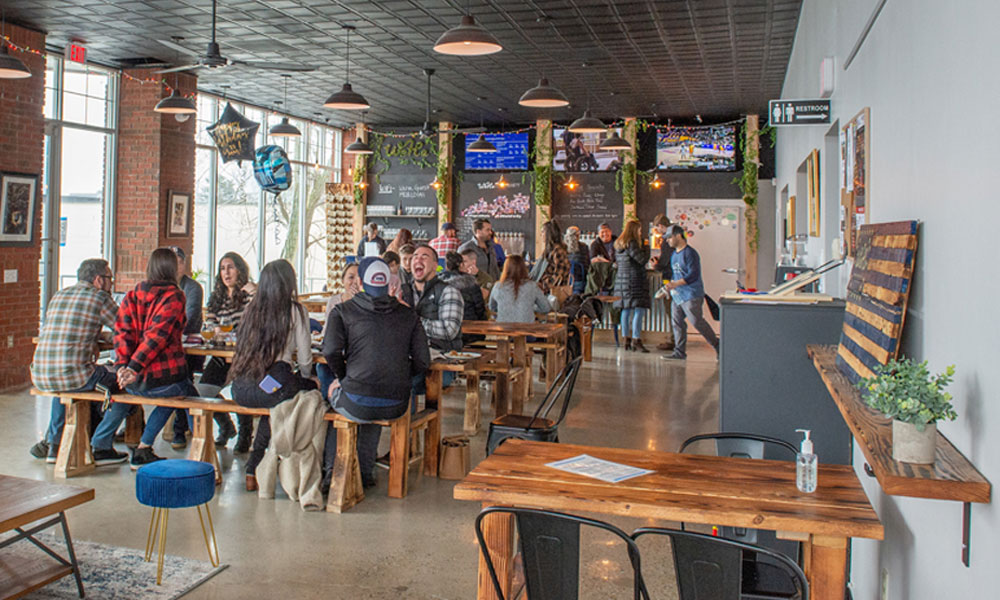
“We definitely took some consideration in the aesthetic for the space,” says WeHa’s McCormack. “Half of the room has a more coffee shop vibe with couches and comfortable seating. The other side is more of a beer hall taproom with long tables.”
McCormack and McCay both note that despite their businesses’ efforts to provide distinct seating, visitors at all hours of the day end up sitting wherever suits their individual preference. That versatility is important when considering a trend both breweries have noticed: after working and drinking coffee all day, many people will stay for a beer before heading home. It can be difficult to figure out the vibe to satisfy both coffee and beer crowds during the early afternoon hours when both are present.
“The biggest challenge has been deciding when we change from coffee shop music to bar music,” says McCay. “You don’t want to put people to sleep in the afternoon, but you don’t want to be throwing heavy metal at them at 8 a.m.”
Seventh Son Brewing | Columbus, Ohio
The challenge of blending morning and afternoon vibes isn’t a problem at Seventh Son Brewing. They aren’t even technically open when folks are working from their taproom. The brewery was approached by Work From Here, an organization that matches home workers with hospitality businesses to benefit both. Work From Here promotes various workspaces on social media and coordinates schedules. The workers use Seventh Son’s taproom—a comfortable space with lots of plants and natural light—in the hours before it opens to the public. The Work From Here crew brings all the cords and office supplies needed for the workday, and Seventh Son provides coffee.
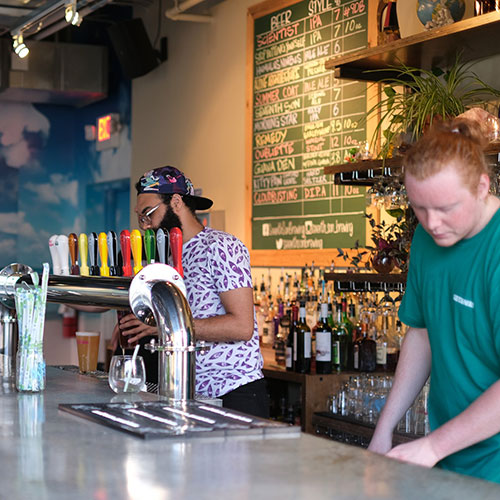
While there’s no direct revenue for the brewery from this arrangement, it still works to their benefit.
“I’d say about a quarter of them end up having a beer at the end of the day,” says co-founder Collin Castore. “It makes people comfortable in the space and some stick around. It’s not a giant change in revenue for us, but I think the goodwill it creates and the general atmosphere are good for us.”
These breweries aren’t alone. Casa Humilde Cerveceria in the Chicago area is planning a coffee shop as part of its new location in the south suburbs, and Alematic Artisan Ales recently brought an attached coffee shop online at its location in Huber Heights, Ohio. Half Full Brewery in Stamford, Connecticut, has built a space called Third Place that is intentionally designed for coworking.
Breweries around the country are catching on to the increased sales, resource utilization, and community-building a workspace or coffee shop add-on can provide. And any time of day you visit, you’re guaranteed a good brew.
CraftBeer.com is fully dedicated to small and independent U.S. breweries. We are published by the Brewers Association, the not-for-profit trade group dedicated to promoting and protecting America’s small and independent craft brewers. Stories and opinions shared on CraftBeer.com do not imply endorsement by or positions taken by the Brewers Association or its members.
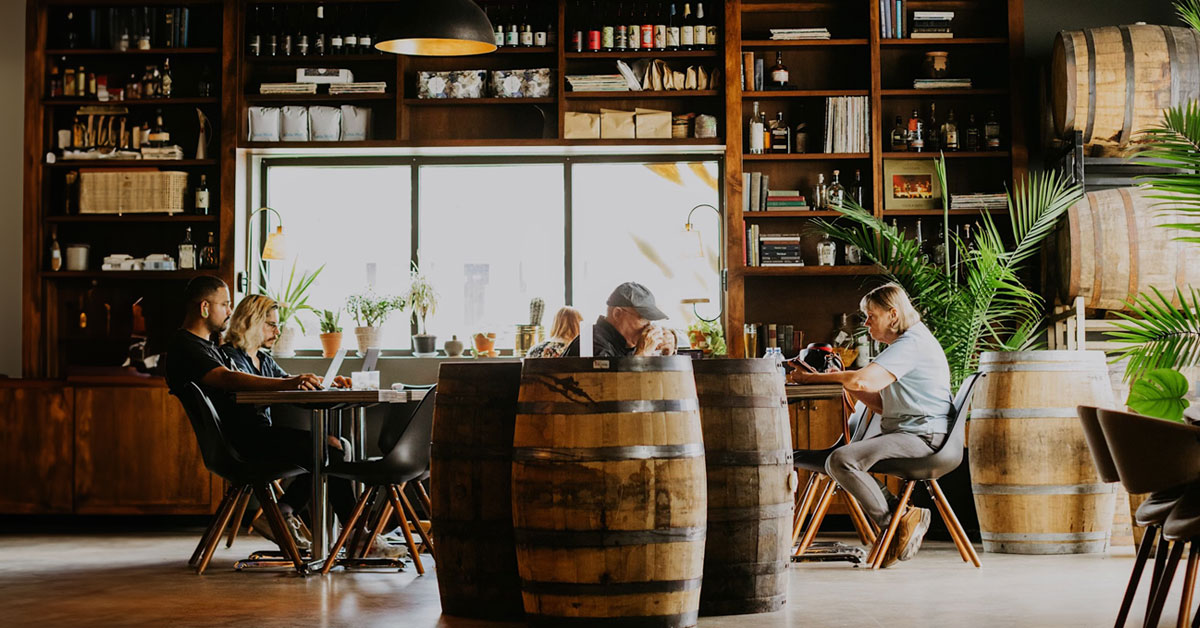

Share Post